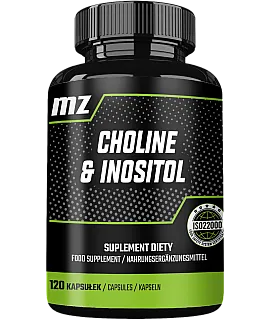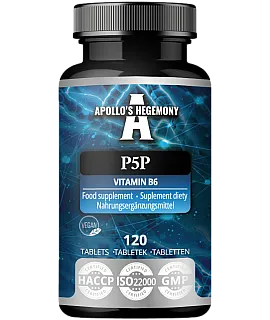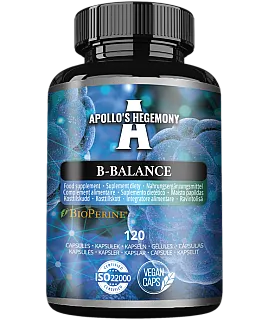B vitamins - what are they and what functions do they perform in the body?

They are insanely important for brain and cardiovascular health, but not only. B vitamins are a team for special tasks. They work in close collaboration with each other, and the presence of each is critical to our health. Supplementation of both the entire package of B vitamins and its individual components is a valuable tool in regulating health. It's worth knowing why we need to consume them every day and what benefits they give us. Read to the end!
- B vitamins and their functions in the body
- Is it better to use the entire B vitamin complex, or each separately?
- When is it better to choose a B vitamin complex?
- When is it better to choose separate B vitamins?
- Functional additives in B-complex supplements
- Good sources of B vitamins in the diet
- Summary
B vitamins and their functions in the body
B vitamins are a group of substances that we need to maintain normal bodily functions. Structurally, they have nothing in common, but are considered members of the same group due to their common characteristics: water solubility and interaction in the same areas of health. They work very closely together in controlling cellular processes and acting as coenzymes in numerous anabolic and catabolic reactions.
There are currently 8 B vitamins:
- vitamin B1 - thiamine
- vitamin B2 - riboflavin
- vitamin B3 - niacin
- vitamin B5 - pantothenic acid
- vitamin B6 - pyridoxine
- vitamin B7 - biotin
- vitamin B9 - folate
- vitamin B12 - cobalamin
Functions of B vitamins
There are a multitude of them, but the most important ones are:
- modulation of energy production,
- supporting brain function,
- production of blood cells,
- DNA/RNA synthesis and repair,
- control of methylation processes,
- participation in the synthesis and metabolism of many neurotransmitters.
B vitamins for the cardiovascular system
The presence of B vitamins is critical in blood-forming processes. Without an adequate supply of them, the body will not be able to produce an adequate number of red blood cells. Supplements with B vitamins (especially B6, B9 and B12) are a standard part of megaloblastic anemia treatment.
The effect of B vitamins on homocysteine metabolism is also of great importance. Homocysteine is a pro-inflammatory factor that increases inflammation of blood vessels and increases the risk of atherosclerosis and other cardiovascular diseases. It takes an adequate supply of vitamins B9 and B12 for homocysteine to be converted back to methionine. This not only lowers homocysteine, but also puts methionine back into circulation, which, in the form of s-adenosyl methionine, is the main donor of methyl groups, thus conditioning the processes of DNA methylation, synthesis of amino acids, nucleic acids and many other insanely important factors. To control homocysteine, vitamin B6 is also needed to break it down to cystathionine. Complexes based mainly on these 3 vitamins (B6, B9 and B12) are used in sizable doses to speed up the process of lowering homocysteine in the blood when there is too much of it.
B vitamins for the brain and well-being
The effects of B vitamins on the brain are extensive. Let's start with the fact that they are essential for the production of cellular energy, so that neurons are properly powered and can work at the right efficiency. This is one of the mechanisms by which B vitamins prevent excessive feelings of fatigue and tiredness.
Another is the extensive participation in the production and metabolism of many neurotransmitters. In this way, B vitamins promote well-being and maintain normal psychological functions.
Vitamin B12 has the additional property of maintaining the good condition of myelin sheaths on neurons. As a result, nerve cells are better protected from damage and the entire nervous system is in better shape.
Is it better to use the entire B vitamin complex, or each separately?
It all depends on the purpose of supplementation and individual predisposition. Both strategies have their place - sometimes it is better to reach for the whole complex in one supplement, and sometimes there is a need to select vitamins on their own and choose their doses precisely.
When is it better to choose a B vitamin complex?
It will be a good choice when:
- your diet is not varied and nutritious;
- you need to lower homocysteine;
- your goals are general such as fatigue reduction, prevention for brain health, cardiovascular support, etc..;
- you don't quite know what your needs are and can't adjust dosages on your own;
- you need a simple and economical solution.
When is it better to choose separate B vitamins?
It is better to choose monopreparations when:
- there is an identified deficiency of a particular vitamin;
- we cannot take any of the B vitamins for various reasons, or we need to take them in a specific form;
- we want to achieve benefits strongly associated with one specific vitamin, e.g. niacin for lowering cholesterol, biotin for hair and nail support, etc...;
- we already take some of the B vitamins in other multivitamin supplements and are left with, for example, 2 missing ones to supplement.
Functional additives in B-complex supplements
Some B-complex vitamin supplements have additional ingredients that are not technically B-vitamins (although they may be so-called "pseudo-vitamins"), but can support or supplement their effects.
- TMG (betaine anhydrous) - an additional donor of methyl groups to the methionine cycle and support in lowering homocysteine;
- PABA - commonly known as vitamin B10, structurally related to folic acid;
- Choline and inositol - interact well with B vitamins, and once considered vitamin B4 and B8, respectively;
- Vitamin C - another vitamin of those water-soluble, for a complete complex. It supplements B vitamins with antioxidant activity and aids in regulating energy metabolism, reducing fatigue and other activities.
Good sources of B vitamins in the diet
In this case, nature is not as friendly as a supplement, and it is difficult to find one food that will provide all eight vitamins. Therefore, the diet should be sufficiently varied so that the entire diet can provide all the B vitamins in adequate amounts.
In general, to provide plenty of B vitamins , you should eat green leafy vegetables, legumes, whole grain products and nuts and seeds frequently.
Vitamin B12 is specific, because we can obtain it almost exclusively from zoonotic foods. The most abundant source of it is meat. This causes difficulties for those on plant-based diets and forces supplementation of this vitamin.
Summary
The role of B vitamins is very broad and each is critical to maintaining good health. On a daily basis, we supplement them mainly from plant foods, and vitamin B12 additionally from zoonotic foods. When supplementation is needed, a full B-Complex is the best choice in most cases, as all B vitamins work closely together. In specific cases, monopreparations can also be used, selecting the vitamin in the right dose and form.
Sources:
-
Kennedy DO. B Vitamins and the Brain: Mechanisms, Dose and Efficacy-A Review. Nutrients. 2016;8(2):68. Published 2016 Jan 27. doi:10.3390/nu8020068
 ⮜ Previous article
⮜ Previous article
Supplements for calming and stress
 Next article ⮞
Next article ⮞


